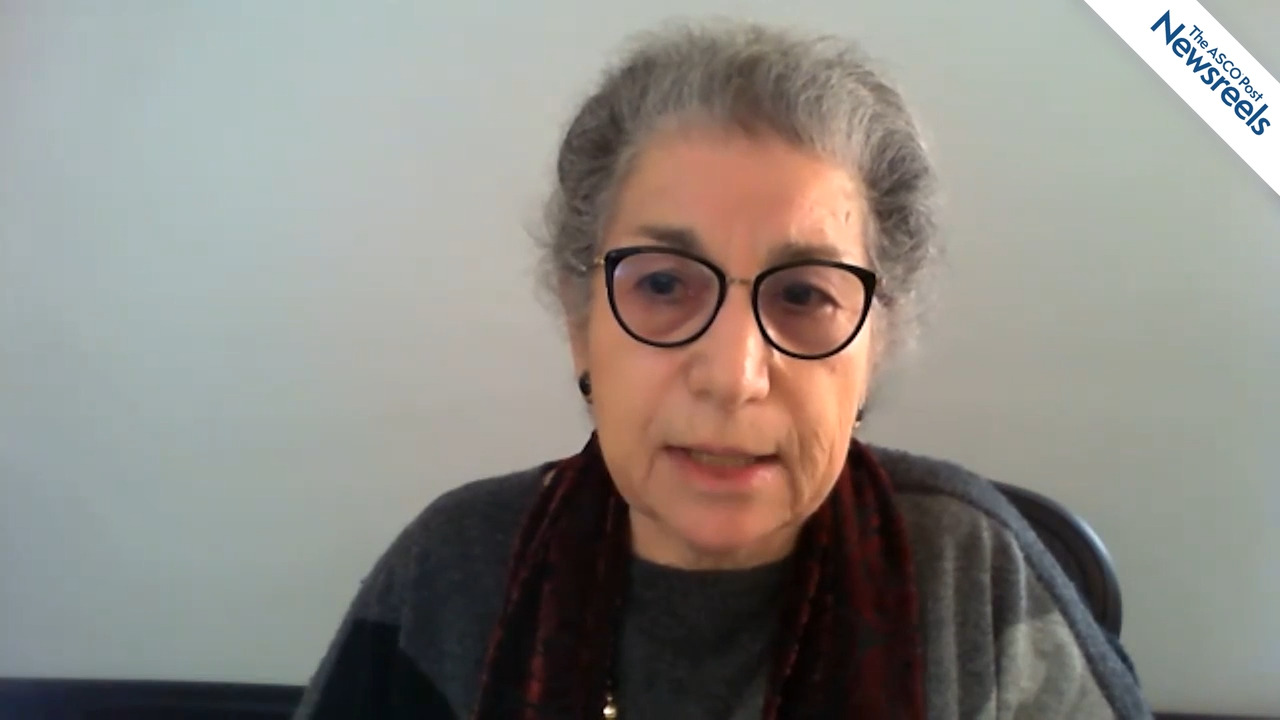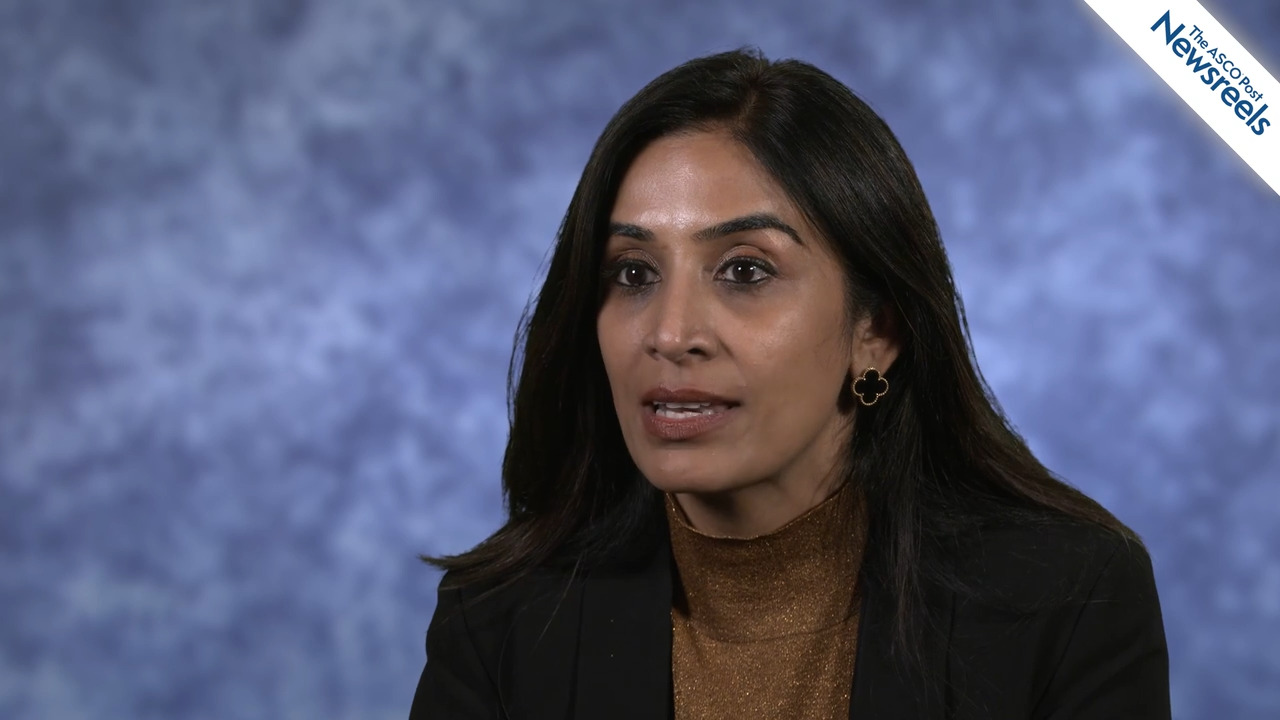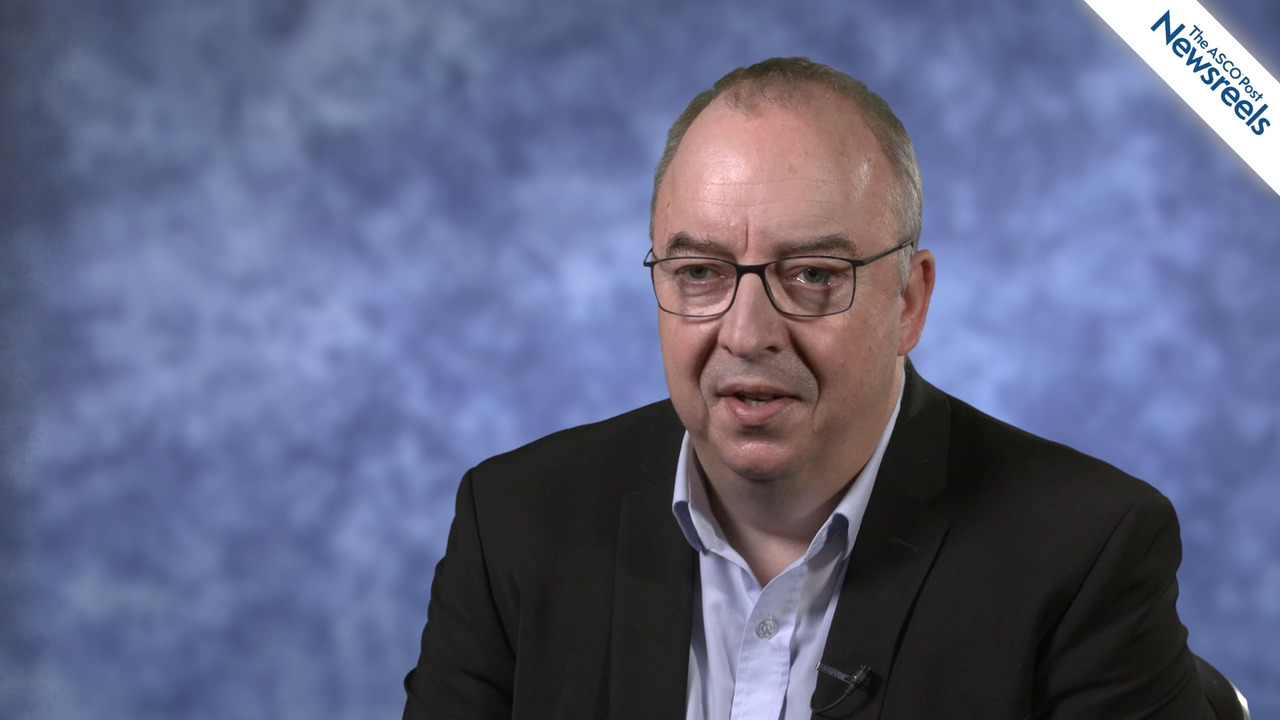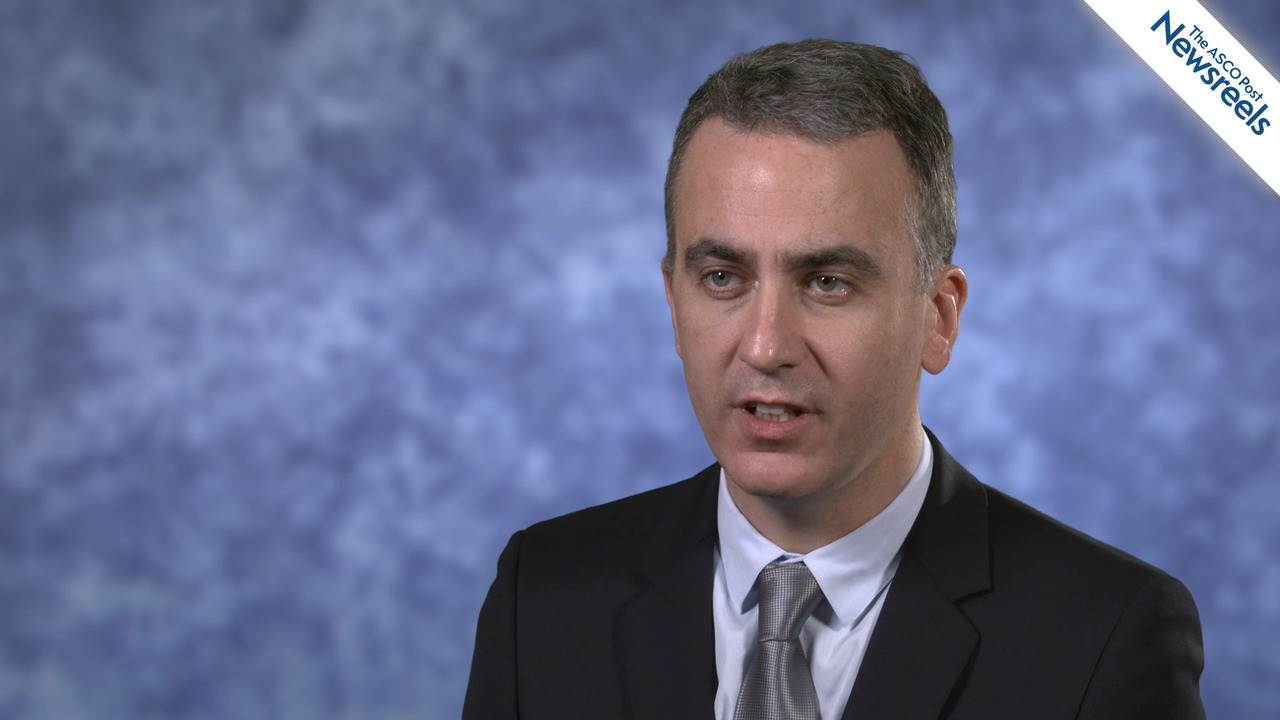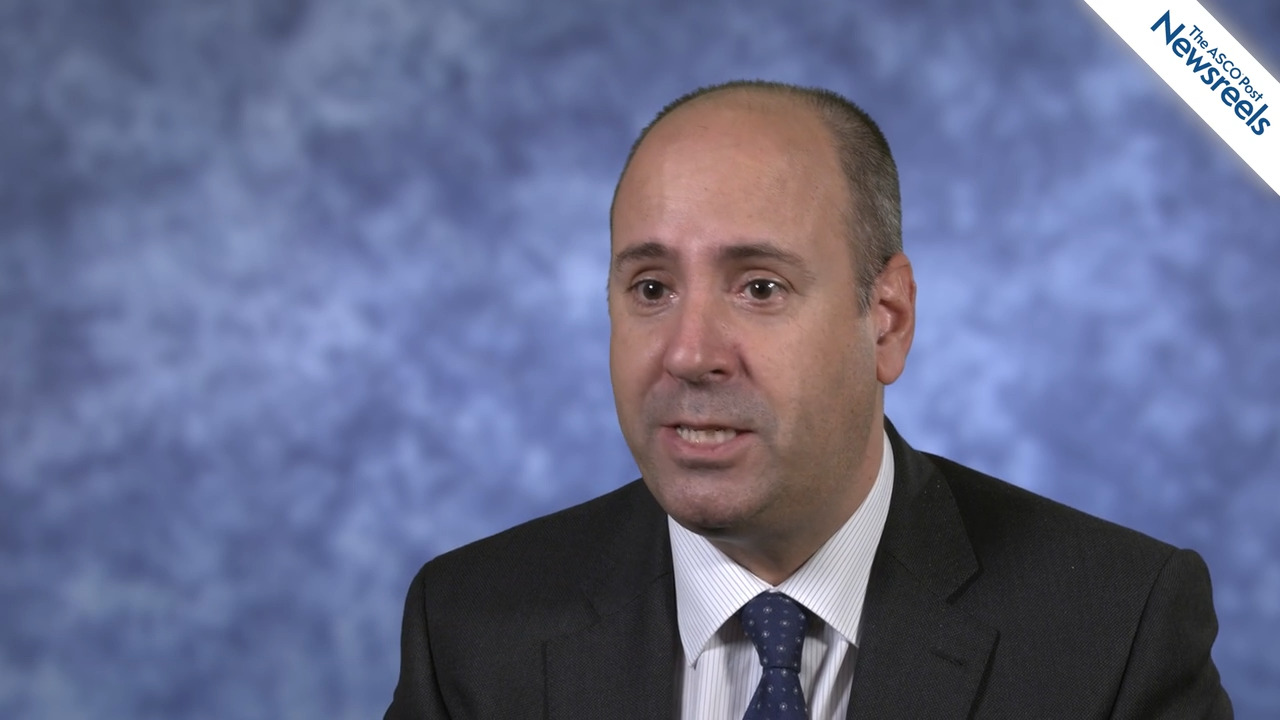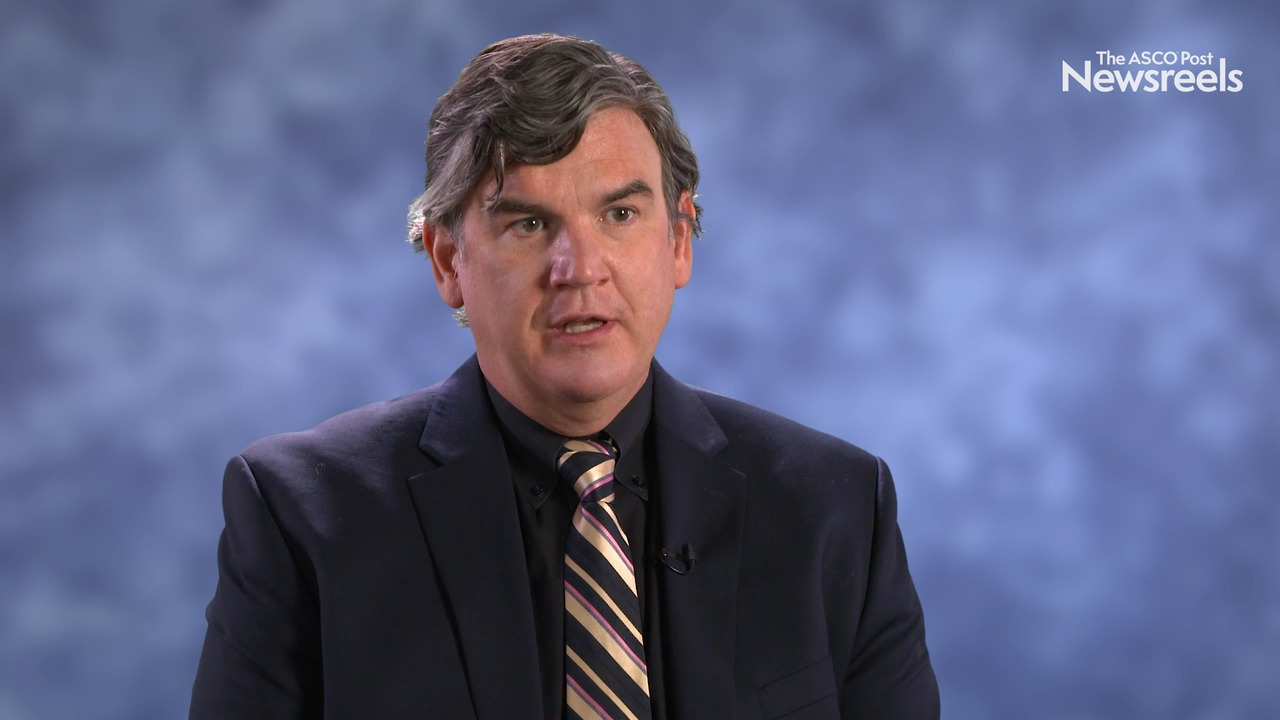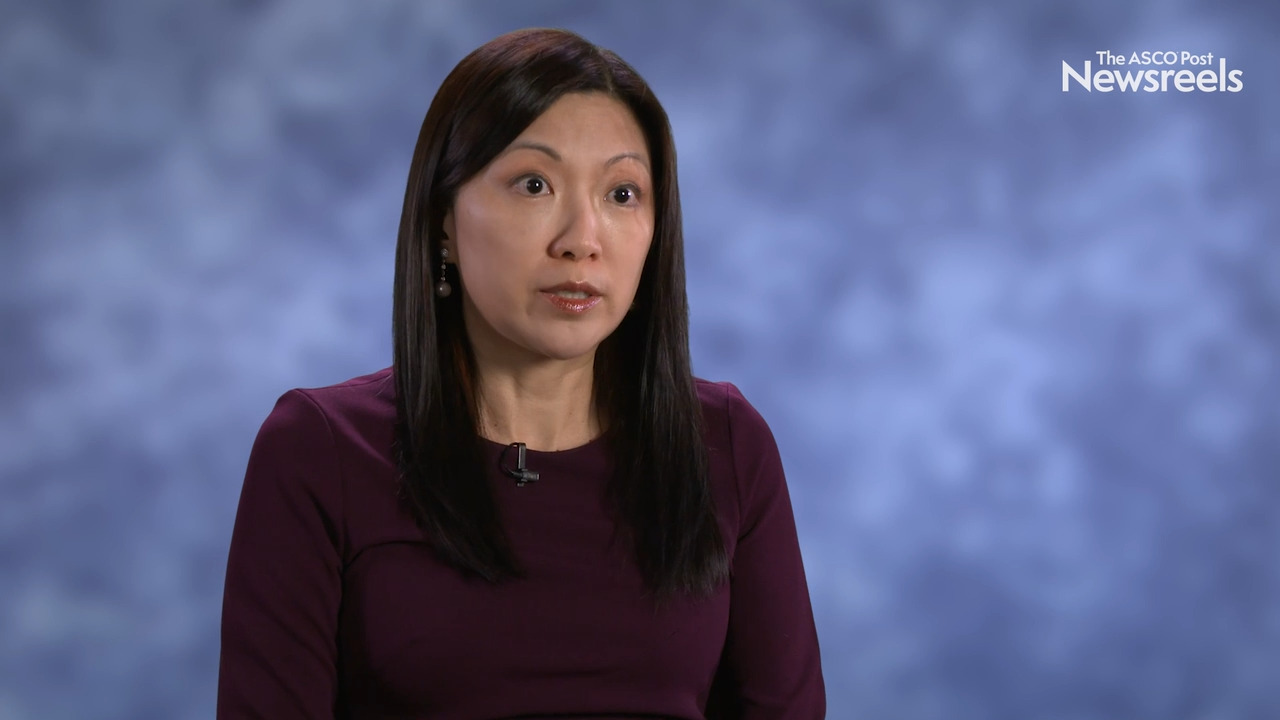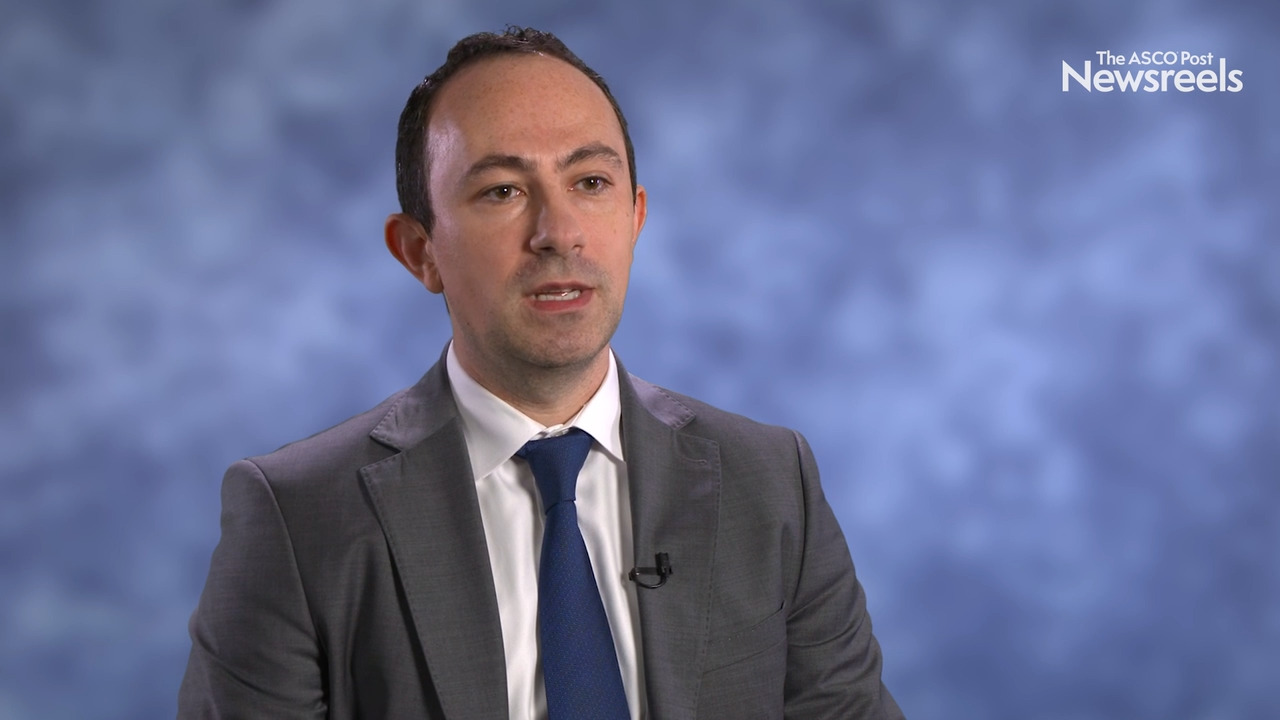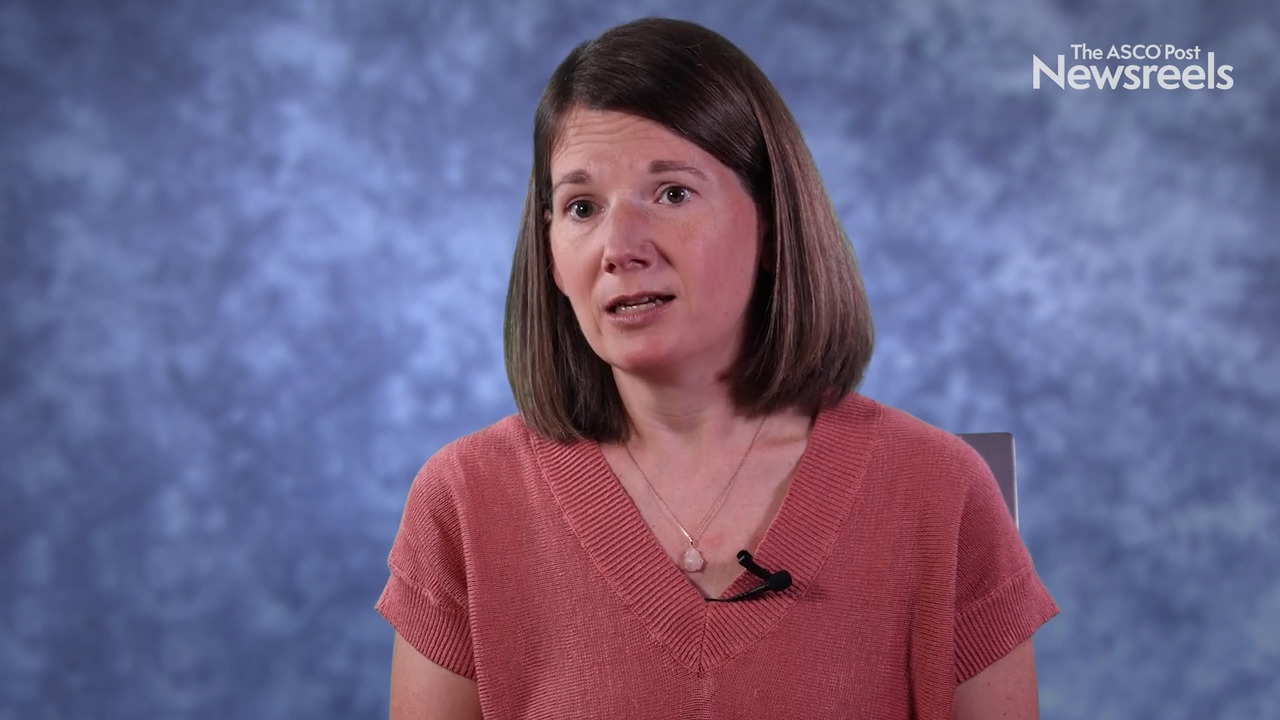Patricia A. Ganz, MD, on Early Breast Cancer, Olaparib, Chemotherapy, and Quality of Life
Patricia A. Ganz, MD, of the University of California, Los Angeles, discusses quality-of-life results from the phase III OlympiA study of adjuvant olaparib after (neo)adjuvant chemotherapy in patients with germline BRCA1/2 mutations and high-risk HER2-negative early breast cancer (Abstract GS4-09).
Komal Jhaveri, MD, on Triple-Negative and Metastatic Breast Cancers: New Data on Neratinib, Fulvestrant, and Trastuzumab
Komal Jhaveri, MD, of Memorial Sloan Kettering Cancer Center, discusses the latest updates from the SUMMIT trial, which explored the combinations of neratinib/fulvestrant/trastuzumab and neratinib plus trastuzumab, as well as fulvestrant alone. The combination regimens appeared to benefit patients with hormone–receptor positive, HER2-mutated metastatic breast cancer who have had prior exposure to CDK4/6 inhibitors, and those with HER2-mutated triple-negative disease (Abstract GS4-10).
Michael Gnant, MD, on HR-Positive, HER2-Negative Early Breast Cancer: Trial Results With Palbociclib Treatment
Michael Gnant, MD, of the Medical University of Vienna, discusses phase III findings from the PALLAS study, which showed that adding 2 years of palbociclib to ongoing adjuvant endocrine therapy did not improve survival for patients with stage II to III hormone receptor–positive, HER2-negative early breast cancer. Dr. Gnant also talks about whether any correlative studies hint at patient subgroups that this regimen may benefit (Abstract GS1-07) .
François-Clément Bidard, MD, PhD, on Metastatic Breast Cancer: Endocrine Therapy and Palbociclib
François-Clément Bidard, MD, PhD, of the Institut Curie, discusses phase III findings of the PADA-1 study, which showed that optimizing endocrine therapy after detecting the ESR1 mutation in patients with hormone receptor–positive, HER2-negative metastatic breast cancer may double their median progression-free survival (Abstract GS3-05).
Javier Cortés, MD, PhD, on Previously Untreated Triple-Negative Breast Cancer: Pembrolizumab Plus Chemotherapy
Javier Cortés, MD, PhD, of the International Breast Cancer Center, discusses the final phase III results of KEYNOTE-355, which showed that pembrolizumab and chemotherapy improved overall and progression-free survival, compared with placebo and chemotherapy, for patients with previously untreated, locally recurrent, inoperable or metastatic triple-negative breast cancer (Abstract GS1-02 ).
Kevin Kalinsky, MD, on HR-Positive HER2-Negative Breast Cancer: Endocrine Therapy and Chemotherapy
Kevin Kalinsky, MD, of the Winship Cancer Institute at Emory University, discusses updated phase III results from the SWOG S1007 (RxPONDER) study of women with one to three positive lymph nodes, and hormone receptor–positive, HER2-negative breast cancer. The data showed that postmenopausal women with recurrence scores (RS) from 0 to 25 continue not to benefit from adjuvant chemotherapy, whereas premenopausal women with a RS from 0 to 25 did benefit from the addition of chemotherapy to endocrine therapy (Abstract GS2-07).
Abemaciclib With Endocrine Therapy in Adjuvant Treatment of Early Breast Cancer
On October 12, 2021, abemaciclib was approved for use with endocrine therapy (tamoxifen or an aromatase inhibitor) for adjuvant treatment of adults with hormone receptor–positive, HER2-negative, node-positive, early breast cancer at high risk of recurrence and a Ki67 score ≥ 20%, as determined by...
Patients With Hormone Receptor–Positive Breast Cancer and Emergent ESR1 Mutations May Benefit From Early Switch to Fulvestrant/Palbociclib
Among patients with hormone receptor–positive breast cancer treated with an aromatase inhibitor plus palbociclib, those who displayed a rising ESR1 mutation detected in their blood before disease progression doubled their median progression-free survival following a switch to fulvestrant plus...
PHOEBE Trial: Pyrotinib/Capecitabine vs Lapatinib/Capecitabine for Previously Treated Patients With HER2-Positive Metastatic Breast Cancer
Among previously treated patients with HER2-positive metastatic breast cancer, those who received pyrotinib plus capecitabine had longer overall survival than those who received lapatinib plus capecitabine, according to updated results from the phase III PHOEBE trial presented by Binghe Xu, MD,...
To Elect or Forgo Radiation Therapy: An Informed Decision for Patients With Breast Cancer
Advances intreating breast cancer “increasingly create opportunities to consider where radiation therapy might safely be omitted,” Reshma Jagsi, MD, DPhil, told participants at the 2021 Lynn Sage Breast Cancer Symposium.1 “But, I would encourage us,” she continued, “not to assume that women who...
Peter Schmid, MD, PhD, on Early-Stage Triple-Negative Breast Cancer: Neoadjuvant Treatment With Pembrolizumab and Chemotherapy
Peter Schmid, MD, PhD, of Barts Cancer Institute, discusses phase III findings from KEYNOTE-522, in which researchers found a generally consistent event-free survival benefit among patients with early-stage high-risk triple-negative breast cancer who were treated with neoadjuvant pembrolizumab plus chemotherapy followed by adjuvant pembrolizumab (Abstract GS1-01).
Elacestrant May Improve Outcomes for Postmenopausal Patients With Progressive ER-Positive HER2-Negative Metastatic Breast Cancer
The investigational oral selective estrogen receptor degrader (SERD) elacestrant significantly decreased the risk of death or disease progression and increased progression-free survival compared with standard-of-care endocrine monotherapy in the second- or third-line setting for postmenopausal...
Elacestrant May Improve Outcomes for Postmenopausal Patients With Progressive ER-Positive HER2-Negative Metastatic Breast Cancer
The investigational oral selective estrogen receptor degrader (SERD) elacestrant significantly decreased the risk of death or disease progression and increased progression-free survival compared with standard-of-care endocrine therapy for postmenopausal patients with estrogen receptor...
PALLAS Trial: Addition of Adjuvant Palbociclib to Endocrine Therapy in Early HR-Positive, HER2-Negative Breast Cancer
As reported at the 2021 San Antonio Breast Cancer Symposium (Abstract GS1-07) and simultaneously in the Journal of Clinical Oncology by Michael Gnant, MD, and colleagues, the final analysis of the phase III PALLAS trial has shown no invasive disease–free survival benefit with the addition of...
Single-Cell Spatial Analysis May Help to Predict Response to Neoadjuvant Atezolizumab in Patients With Triple-Negative Breast Cancer
A next-generation technology that allows the study of protein expression at the single-cell level and the location of the cells within the tumor microenvironment was feasible and provided information on the benefit of adding the immune checkpoint inhibitor atezolizumab to chemotherapy as...
Molecular Tumor Profiling May Improve Treatment Matching for Patients With Metastatic Breast Cancer
The use of multigene sequencing and SNP array as a therapeutic decision tool improved the outcomes of patients with metastatic breast cancer if the patients carried alterations classified in the I/II tiers of the ESMO Scale for Clinical Actionability of Molecular Targets (ESCAT), according to...
I-SPY2 Study Finds Tumor Biology Is a More Significant Factor Than Race in Predicting Response to Breast Cancer Treatment
Data analysis from the I-SPY2 clinical trial found that among women with high-risk breast cancer, race did not significantly affect several key measures of breast cancer treatment outcomes, including pathologic complete response (pCR) and event-free survival. The study, which is being presented by...
Study Examines Rates of Lymphedema in Black and White Patients With Breast Cancer
Black women had a 3.85-fold increased risk of developing lymphedema following treatment for breast cancer compared to White women, according to the results from a study by Barrio et al being presented at the 2021 San Antonio Breast Cancer Symposium (Abstract GS4-01). In addition, the researchers...
KEYNOTE-355 Final Analysis Reveals Survival Benefit With Pembrolizumab in Triple-Negative Breast Cancer
The final overall survival results from the KEYNOTE-355 study showed a statistically significant 27% reduction in the risk of death for patients with metastatic triple-negative breast cancer whose tumors were strongly positive for PD-L1, defined as a combined positive score (CPS) of at least 10 and ...
To Elect or Forgo Radiation Therapy: An Informed Decision for Patients With Breast Cancer
Advances in treating breast cancer “increasingly create opportunities to consider where radiation therapy might safely be omitted,” Reshma Jagsi, MD, DPhil, told participants at the 2021 Lynn Sage Breast Cancer Symposium.1 “But, I would encourage us,” she continued, “not to assume that women who...
Hans Wildiers, MD, on Metastatic Breast Cancer: Comparing Addition of Eftilagimod Alpha vs Placebo to Paclitaxel
Hans Wildiers, MD, of University Hospitals Leuven, discusses the final results from the phase IIb AIPAC study, which suggested that eftilagimod added to paclitaxel may be of benefit to patients older than 65 years with hormone receptor–positive, HER2-negative metastatic breast cancer after endocrine-based therapy. Eftilagimod, which is a first-in-class antigen presenting cell activator, appeared to increase circulating CD4/CD8 T cells, which correlated to improved overall survival (Abstract 948).
Study Examines the Effect of Breast MRI on Short-Term Quality of Life in Women With DCIS
In a substudy of the ECOG-ACRIN E4112 cohort trial reported in JAMA Network Open, Fazeli et al found that approximately half of women with ductal carcinoma in situ (DCIS) undergoing magnetic resonance imaging (MRI) for pretreatment planning experienced fear or anxiety before and during the...
Eftilagimod Alpha Plus Paclitaxel May Improve Survival in HR-Positive, HER2-Negative Metastatic Breast Cancer: AIPAC Trial
The addition of the LAG-3 protein eftilagimod alpha to paclitaxel led to a significant improvement in overall survival in younger patients with hormone receptor (HR)-positive, HER2-negative metastatic breast cancer, according to data presented by Hans Wildiers, MD, and colleagues at the Society for ...
Aditya Bardia, MD, MPH, Comments on Findings From monarchE
The invited discussant of monarchE,1 Aditya Bardia, MD, MPH, Director, Breast Cancer Research, and Associate Professor of Medicine, Harvard Medical School, commented: “Based on a hazard ratio of 0.69 for invasive disease–free survival, the results are statistically significant and clinically...
Long-Term Follow-up of monarchE: Benefit of Abemaciclib Plus Endocrine Therapy Maintained in Early High-Risk Breast Cancer
Longer-term follow-up of the global phase III monarchE trial showed an increasing benefit for adding abemaciclib to endocrine therapy in the adjuvant treatment of early high-risk hormone receptor–positive, HER2-negative breast cancer, regardless of Ki67 index. The latest findings were reported at a ...
Phase II Breast Cancer Trial: Large Declines in Ki67 Index Seen With Oral Selective Estrogen Receptor Degrader
In the phase II coopERA Breast Cancer trial, which evaluated two endocrine neoadjuvant therapies in estrogen receptor–positive, HER2-negative early breast cancer, the oral selective estrogen receptor degrader giredestrant led to a greater reduction in Ki67 level—a measure of cancer cell...
Duration of Endocrine Therapy in Breast Cancer: How Much of a Good Thing Is Too Much?
Estrogen receptor–positive breast cancer is the most common type of breast cancer, diagnosed in more than 2.3 million women around the world each year, including more than 200,000 in the United States alone. Adjuvant endocrine therapy is a mainstay of treatment for these millions of women and is a...
No Disease-Free Survival Difference With Longer Anastrozole Treatment After Endocrine Therapy in HR-Positive Breast Cancer
In an Austrian Breast and Colorectal Cancer Study Group phase III trial (ABCSG-16/SALSA) reported in The New England Journal of Medicine, Michael Gnant, MD, of the Comprehensive Cancer Center, Medical University of Vienna, and colleagues found no difference in disease-free survival with 2 vs 5...
Can SBRT to Selected Sites of Limited Progression or Oligoprogression Extend Progression-Free Survival in Advanced Lung Cancer but Not Breast Cancer?
Stereotactic body radiation therapy (SBRT) lengthens progression-free survival for patients with advanced lung cancer who have oligoprogression (ie, tumors that have not been fully responsive to systemic chemotherapy or immunotherapy), according to an interim analysis of the CURB oligoprogression...
Accelerated Radiation Therapies Move Forward in Early Breast Cancer
Two studies reported at the 2021 American Society for Radiation Oncology (ASTRO) Annual Meeting provide evidence in support of the use of accelerated radiation therapies as safe alternatives to standard radiotherapy options following breast-conserving surgery. The phase III MC1635 trial showed...
AI-Based Breast Cancer Risk Model: Multi-institution Validation
In a study reported in the Journal of Clinical Oncology, Yala et al found that using the artificial intelligence (AI)-based Mirai model across diverse populations resulted in consistently accurate predictions of breast cancer risk based on screening mammography. Study Details In the study, Mirai...
Exercise Program May Help to Reduce Upper Limb Disability After Breast Cancer Surgery
Arm and shoulder disability and pain that some women who have had breast cancer surgery experience as a side effect of their procedure may be reduced by following a physiotherapy-led exercise program, according to a new study published by Bruce et al in The BMJ. The report showed an improvement in...
Yongbae Kim, MD, on Elective Internal Mammary Node Irradiation in Women With Node-Positive Breast Cancer: Results of a Randomized Phase III Trial
Yongbae Kim, MD, of the Yonsei Cancer Center and Yonsei University College of Medicine, discusses findings that showed the use of internal mammary area irradiation (IMNI) in regional nodal irradiation did not significantly improve disease-free survival for women with node-positive breast cancer. However, patients with medially or centrally located tumors may be considered for treatment with IMNI (Abstract 2).
Expert Point of View: Monica Arnedos, MD, PhD
The invited discussant of BrighTNess,1 Monica Arnedos, MD, PhD, Head of the Breast Cancer Research Program at the Institut Bergonié in Bordeaux, France, said the findings add to growing support for using carboplatin in triple-negative breast cancer, but their clinical application could be...
BrighTNess: Neoadjuvant Carboplatin Improves Event-Free Survival in Triple-Negative Breast Cancer
In patients with early resectable triple-negative breast cancer, not only did the addition of carboplatin to standard neoadjuvant chemotherapy improve pathologic complete response rates, it also improved 4-year event-free survival, regardless of BRCA status, according to the latest analysis of the...
CDK4/6 Inhibitors Combined With Fulvestrant for Hormone Receptor–Positive, HER2-Negative Advanced Breast Cancer: FDA Analysis of Overall Survival
In an exploratory U.S. Food and Drug Administration (FDA) pooled analysis reported in The Lancet Oncology, Jennifer J. Gao, MD, and colleagues found that the addition of CDK4/6 inhibitor treatment to fulvestrant resulted in a consistent overall survival benefit vs placebo plus fulvestrant in...
Fear of Side Effects and Lack of Awareness: Barriers to Greater Use of Risk-Reducing Medications for Breast Cancer
A “big problem, maybe the major one,” with risk-reducing medications for breast cancer is low uptake among women at high risk of breast cancer,” Seema A. Khan, MD, told participants at the 2021 Annual Lynn Sage Breast Cancer Symposium.1 Dr. Khan is Professor of Surgery and the Bluhm Family...
Risk-Reducing Medications for Breast Cancer Are Becoming Safer and More Tolerable
Risk-reducing medications for breast cancer may be effective for many women, and recently reported and ongoing trials have led to improvements in their tolerability and safety, Seema A. Khan, MD, reported at the 2021 Annual Lynn Sage Breast Cancer Symposium (virtual).1 Dr. Khan is Professor of...
Optimizing Adjuvant Therapy for Women With Estrogen Receptor–Positive, Node-Positive Breast Cancer
“Nodal status remains the single most important prognostic marker in outcomes for women with estrogen receptor–positive, HER2-negative breast cancer. For that reason, it makes sense to think about optimizing adjuvant therapy, including endocrine treatments, chemotherapy, and targeted therapy,”...
Adjuvant Internal Mammary Node Irradiation in Node-Positive Breast Cancer
In a Korean phase III trial reported in JAMA Oncology, Kim et al found that the addition of internal mammary node irradiation to adjuvant regional nodal irradiation did not improve 7-year disease-free survival in women with node-positive breast cancer. In an ad hoc analysis, however, benefit was...
Germline Pathogenic Variants in Cancer Predisposition Genes and Risk for Invasive Lobular Carcinoma of the Breast
In a study reported in the Journal of Clinical Oncology, Yadav et al found that germline pathogenic variants in the cancer predisposition genes ATM, BRCA2, CDH1, CHEK2, and PALB2 were associated with an increased risk of invasive lobular carcinoma of the breast, with no association with BRCA1...
Retrospective Study Examines Real-World Survival in U.S. Women Treated for Early-Stage Breast Cancer
In a retrospective cohort study reported in JCO Oncology Practice, Gidwani et al found that among U.S. patients treated for early-stage breast cancer, those who were considered to be unrepresented in clinical trials have significantly poorer survival than those categorized as well represented....
Matthew Manning, MD, on Resolving Racial Disparities in the Treatment of Breast and Lung Cancers
Matthew Manning, MD, of Cone Health Cancer Center, discusses findings that showed changes to the way cancer care is delivered may help eliminate racial disparities in survival among patients with early-stage lung and breast cancers. Identifying and addressing obstacles that kept patients from finishing radiation treatments for cancer were associated with improved 5-year survival rates for all patients (Abstract 53).
C. Jillian Tsai, MD, PhD, on Using Radiotherapy to Thwart Tumor Growth in Advanced Cancers
C. Jillian Tsai, MD, PhD, of Memorial Sloan Kettering Cancer Center, discusses results from the first randomized trial of stereotactic body radiation therapy (SBRT) to treat oligoprogressive, metastatic lung and breast cancers. The standard of care for patients with these types of tumors is to switch to a different systemic treatment. Adding local therapy such as SBRT may help treat drug-resistant lesions (Abstract LBA3).
Rates of Occult Gastric Carcinoma in Patients With Hereditary Lobular Breast Cancer Due to CDH1 Genetic Variants
In a single-institution prospective cohort study reported in JAMA Surgery, Gamble et al found that patients with hereditary lobular breast cancer due to CDH1 variants also had a high prevalence of occult signet ring cell gastric carcinoma. Study Details The study involved 283 patients from 151...
Survey of U.S. Oncologists on Genetic Counseling and Testing for Black Women With Breast Cancer
As reported in the Journal of Clinical Oncology by Ademuyiwa et al, a survey of U.S. breast oncologists showed that physicians believe that Black women with breast cancer face more barriers to genetic counseling and testing compared to White women with breast cancer. Study Details The study...
Youssef Zeidan, MD, PhD, on HER2-Positive Breast Cancer: Treatment-Related Cardiotoxicity
Youssef Zeidan, MD, PhD, of Florida International University and the Lynn Cancer Institute, discusses the advances in radiotherapy planning and delivery that have reduced cardiac radiation exposure in patients with HER2-positive breast cancer who are treated with radiotherapy and trastuzumab (Abstract 12).
ACCURE Trial Aims to Eliminate Disparities in Survival in Black and White Patients With Early-Stage Lung and Breast Cancers
A study presented by Manning et al at the 2021 American Society for Radiation Oncology (ASTRO) Annual Meeting (Abstract 53) showed that interventions to help Black patients overcome obstacles to completion of treatment can impact disparities in survival outcomes between Black and White patients...
Urbanization in Bangladesh: The Prevalence of Breast Cancer Brings Unique Challenges
The number of deaths related to breast cancer are increasing at an alarming pace worldwide. According to a World Health Organization (WHO) 2020 report, approximately 2,088,849 new cases and 627,000 deaths related to breast cancer occurred in 2018.1 More than 55% of these deaths occurred in low- to ...
Katherine E. Reeder-Hayes, MD, MBA, on Geography, Breast Cancer Treatment, and Racial Disparities
Katherine E. Reeder-Hayes, MD, MBA, of the University of North Carolina at Chapel Hill, discusses the timeliness of breast cancer care for Black women compared with non-Black women in North Carolina. Her data showed that greater geographic variation exists in the timeliness of breast cancer care for Black women, with regions surrounding larger urban centers having the largest disparities.
